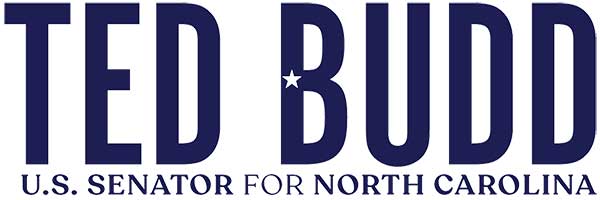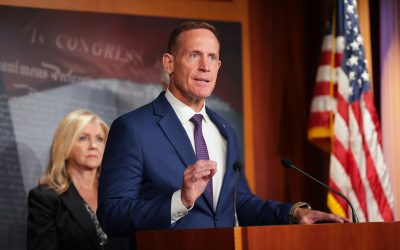Washington, D.C. — Senator Ted Budd (R-NC) has joined a letter to the Food and Drug Administration (FDA) raising concerns over the Biden administration’s plans to restrict tobacco products for Americans, potentially creating opportunities for Mexican cartels to profit from illegal tobacco on the black market.
The letter was led by Senator Bill Cassidy, M.D. (R-LA) and co-signed by Senators Marco Rubio (R-FL) and Bill Hagerty (R-TN).
Background:
- In April 2022, the FDA published a proposed rule that would prohibit menthol flavoring in cigarettes.
- The FDA has also publicly announced plans to impose maximum nicotine levels in cigarettes.
- Law enforcement groups, including the National Association of Police Organizations and the National Organization of Black Law Enforcement Executives, expressed serious concern that these policies would dramatically expand illicit markets for cigarettes and lead to enforcement that would unnecessarily target minority communities.
We write to express our concern about the impact of future rulemaking by the Food and Drug Administration (FDA) on black market sales of tobacco products. FDA is planning new rules to prohibit the sale of menthol cigarettes and institute a maximum nicotine level on tobacco products. We are concerned that Mexican transnational criminal organizations (TCOs), and other criminal elements, could seek to exploit black market opportunities that such policies could create. If FDA moves forward with such policies, it must take steps to mitigate this risk.
Mexican TCOs pose a grave threat to American national security and public health. The Drug Enforcement Administration (DEA) labeled these organizations “the greatest criminal drug threat the United States has ever faced.” TCOs control most of the U.S. drug market, and are responsible for trafficking the illegal drugs, including marijuana, heroin and fentanyl, that drove the record number of drug overdose deaths in the U.S. in 2022.
While the primary threat from Mexican TCOs come from trafficking in illicit drugs, these
organizations have diversified their activities in response to changing conditions. As it has become easier to sell marijuana products in the U.S., Mexican TCOs have prioritized trafficking fentanyl and other synthetic drugs that are cheaper to manufacture, easier to transport, and generate more profit. But Mexican TCOs are also using other activities, both legal and illegal, to fund their lethal operations. These organizations have engaged in extensive human trafficking with an estimated 70% of trafficking victims in the United States coming from Mexico. Human trafficking is estimated to provide $13 billion a year in revenue to TCOs. TCOs are also leveraging agriculture for additional revenue streams. For example, in February 2022, the U.S. Department of Agriculture (USDA) temporarily suspended Mexican imports of avocados into the United States due to threats against American safety inspectors in Mexico. Similarly, the price of limes increased 90% between December 2020-2021 due in part to expanded cartel activity in lime production.
More specifically, these TCOs have expanded their operations to include the production and distribution of cigarettes. Last month, we sent a letter to the Department of the Treasury requesting they take action against Tobacco International Holdings (TIH), a Switzerland-based business with alleged ties to the Cártel de Jalisco Nueva Generación (CJNG), a major Mexican TCO. TIH has taken advantage of a growing illegal cigarette market in Mexico, where approximately 19% of cigarettes are illegally produced. TIH has also been accused of using violence and coercion to sell their products to merchants. TCOs more generally have taken advantage of drug smuggling routes to import illegal cigarettes into the U.S., contributing to the significant use of smuggled cigarettes.
We are concerned that potential FDA actions to prohibit the sale of popular tobacco products may expand black market opportunities for TCOs, from Mexico or otherwise, to sell illegal tobacco products in the U.S. In May 2022, FDA published a proposed rule that would prohibit menthol in cigarettes. FDA has also announced plans to implement a maximum nicotine level on all tobacco products and is expected to publish a proposed rule for such ceiling later this year. This letter takes no position on those specific rules – ensuring that tobacco products are safely regulated is a public health priority for all stakeholders.
However, FDA must examine the potential effect of such actions to empower Mexican TCOs and other criminal elements to exploit black markets for tobacco products. Law enforcement officials have raised concerns that FDA’s actions could inadvertently expand black market tobacco sales. For example, a coalition of approximately 700,000 law enforcement officers said the following about a ban on menthol in cigarettes: “It will increase multiple categories of crimes in our communities. The data is clear that illicit tobacco attracts gangs and organized crime.” Indeed, black market tobacco sales expanded in the United Kingdom after the government implemented a maximum nicotine level on tobacco products in 2017. Black market tobacco products also pose a higher health risk to consumers, as they are not subject to any regulation or inspection to ensure they meet quality standards.
Before finalizing any tobacco prohibitions and limitations, FDA should consult with agencies that fight Mexican TCOs on a daily basis. These agencies include the DEA, the Department of State, Federal Bureau of Investigation (FBI), Bureau of Alcohol, Tobacco, Firearms and Explosives (ATF), Customs and Border Protection (CBP), and Department of Homeland Security (DHS). There is significant risk that in the absence of a regulated market, Mexican TCOs will combine their existing tobacco operations with their extensive distribution networks to traffic into the United States the very products that FDA could deem illegal. These agencies possess deep understanding of TCO activities that FDA lacks, and their perspective is critical to ensure that these proposals do not create an exploding black market for tobacco products.
FDA should also outline how it plans to use its own enforcement tools to deter the sale of illegal products. While FDA has extensive authority under the Tobacco Control Act (TCA) to act against illicit products, enforcement action has been inconsistent. The Independent Expert Panel convened by the Reagan-Udall Foundation recognized that FDA “has failed to clear the market of illegal products,” and has not been transparent about “whether its policy preference is to do so.” Implementing a robust enforcement framework to deter illegal products is an important step to improve public health.
We encourage FDA to address concerns with its current enforcement approach, including in conjunction with issuing any future rules, and to work closely with other federal agencies who have a thorough understanding of TCOs when enacting and implementing policies related to tobacco products.
We thank you for your attention to this letter.
###



